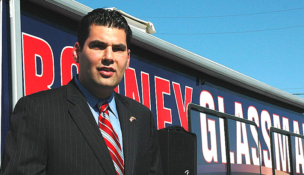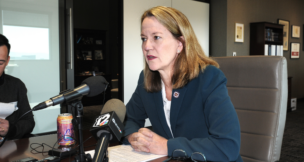Appeals court upholds employer sanctions law, but battle still rages
Arizona Capitol Reports Staff//September 19, 2008//[read_meter]
Appeals court upholds employer sanctions law, but battle still rages
Arizona Capitol Reports Staff//September 19, 2008//[read_meter]
The 9th Circuit Court of Appeals upheld Arizona’s employer sanctions law, which penalizes businesses that knowingly hire illegal immigrants and requires them to verify the employment status of their workers.
But the Sept. 17 ruling by a three-judge panel may not be the last word on the matter.
The business and Hispanic groups that filed the lawsuit and contended the state law infringes on federal powers and violates the due-process rights of employers may decide to seek an en banc review, in which 11 judges on the 9th Circuit Court of Appeals would hear arguments in the case and issue a ruling.
Court rules permit such a hearing only if the decision of the initial appeals panel conflicts with a Supreme Court decision, if it conflicts with an earlier ruling by the 9th Circuit, or if the case involves an especially important point of law.
David Jones, president of the Arizona Contractors Association, one of the plaintiffs in the suit, pointed to a June ruling by the 9th Circuit — which came four days after attorneys gave oral arguments in the employer sanctions challenge — that said an employer is not justified in firing an employee solely on the basis of receiving a letter from the Social Security Administration stating the employee’s Social Security number does not match the federal database.
That decision, Jones said, seems to contradict the court’s ruling to uphold the sanctions law, which requires Arizona employers to fire employees who are determined unauthorized to work by the federal E-Verify employment eligibility database.
“I’m not a lawyer, but it’s confusing to me,” he said.
A spokesman for the 9th Circuit Court said the plaintiffs in the sanctions challenge can file a motion asking the case to be reconsidered. If the three-judge panel that ruled previously in the suit decides against reconsideration, the matter may be taken up for an en banc review if a majority of the active judges — excluding those on the three-judge panel — votes to accept it.
The spokesman said there are 27 active judges in the 9th Circuit Court, meaning 24 would be eligible to vote for an en banc review, and the lawsuit would need the support of 13 judges to secure a hearing before the larger panel.
Rep. Russell Pearce, who spearheaded the effort to enact a state law to punish businesses for hiring illegal immigrants, said the ruling and the case Jones cited are distinctly different.
The Mesa Republican said the state sanctions law requires use of the federal E-Verify system that screens employees through federal databases to ensure they are eligible to work. While it does use information from the Social Security database, it also accesses data from the Department of Homeland Security.
Additionally, Pearce said, employees who receive a “tentative non-confirmation” from E-Verify are given eight days to challenge that finding and correct any errors in the federal databases. During that time, the employers are prohibited from taking any adverse action against the employee.
“They may try that,” Pearce said of an en banc review and an argument based on the Aramark case, “but they know they’ll lose there, too.”
The three-judge panel ruled that federal law does not pre-empt the state from penalizing businesses by suspending or revoking their licenses to operate if they are convicted of knowingly hiring illegal immigrants.
However, the ruling left the door open for other challenges to the law, noting that no businesses have been prosecuted in the nearly nine months the law has been on the books.
“If and when the statute is enforced, and the factual background is developed, other challengers to the (law) as applied in any particular instance or manner will not be controlled by our decision,” Judge Mary M. Schroeder wrote in the ruling.
Lawyers for the state argued that the federal statute allows states to take licensing actions against violators even though federal hiring law prevents states from imposing civil or criminal penalties against businesses for illegal hirings. The appellate court agreed with that argument.
Pearce called the ruling a victory.
“You know what? Even the 9th Circuit gets things right every once in a while. What a great ruling,” he said.
Jones said he wasn’t surprised by the ruling, given the hostility the judges showed toward the arguments against the law when attorneys presented their cases before the San Francisco court in June.
“I didn’t hear any comments from any of the judges on the panel that they favored any of our arguments on our case,” he said.

















